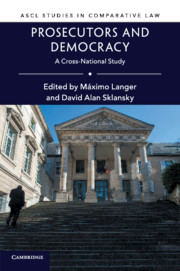Book contents
- Prosecutors and Democracy
- ASCL Studies in Comparative Law
- Prosecutors and Democracy
- Copyright page
- Contents
- Contributors
- Introduction
- 1 Discretion and Accountability in a Democratic Criminal Law
- 2 Accounting for Prosecutors
- 3 The Democratic Accountability of Prosecutors in England and Wales and France: Independence, Discretion and Managerialism
- 4 The French Prosecutor as Judge. The Carpenter’s Mistake?
- 5 German Prosecutors and the Rechtsstaat
- 6 The Organization of Prosecutorial Discretion
- 7 Prosecutors, Democracy, and Race
- 8 Prosecuting Immigrants in a Democracy
- 9 Beyond Tough on Crime: Towards a Better Politics of Prosecution
- 10 Unpacking the Relationship between Prosecutors and Democracy in the United States
- Epilogue
- Index
- References
9 - Beyond Tough on Crime: Towards a Better Politics of Prosecution
Published online by Cambridge University Press: 13 October 2017
- Prosecutors and Democracy
- ASCL Studies in Comparative Law
- Prosecutors and Democracy
- Copyright page
- Contents
- Contributors
- Introduction
- 1 Discretion and Accountability in a Democratic Criminal Law
- 2 Accounting for Prosecutors
- 3 The Democratic Accountability of Prosecutors in England and Wales and France: Independence, Discretion and Managerialism
- 4 The French Prosecutor as Judge. The Carpenter’s Mistake?
- 5 German Prosecutors and the Rechtsstaat
- 6 The Organization of Prosecutorial Discretion
- 7 Prosecutors, Democracy, and Race
- 8 Prosecuting Immigrants in a Democracy
- 9 Beyond Tough on Crime: Towards a Better Politics of Prosecution
- 10 Unpacking the Relationship between Prosecutors and Democracy in the United States
- Epilogue
- Index
- References
Summary

- Type
- Chapter
- Information
- Prosecutors and DemocracyA Cross-National Study, pp. 227 - 249Publisher: Cambridge University PressPrint publication year: 2017
References
References
Cases
- 1
- Cited by



